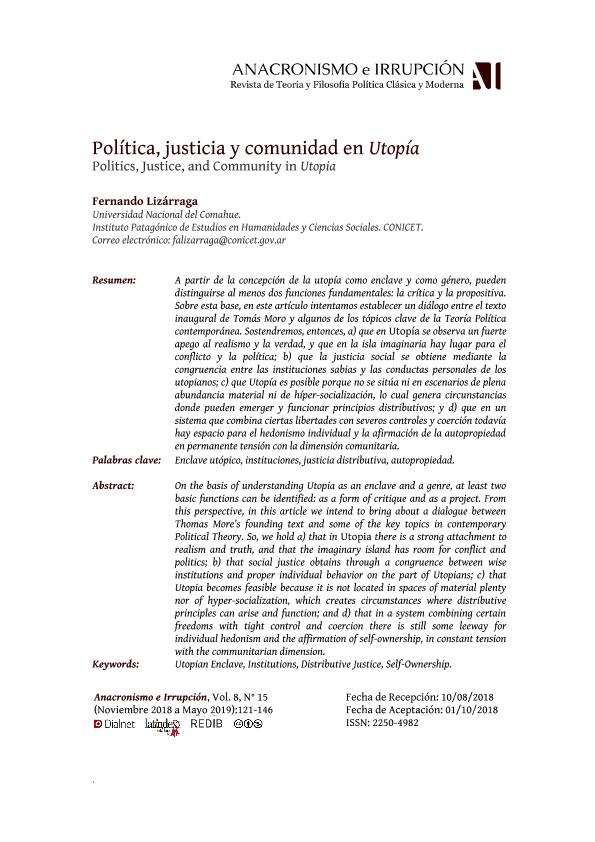Mostrar el registro sencillo del ítem
dc.contributor.author
Lizárraga, Fernando Alberto

dc.date.available
2019-11-25T22:25:39Z
dc.date.issued
2018-11
dc.identifier.citation
Lizárraga, Fernando Alberto; Política, justicia y comunidad en Utopía; Universidad de Buenos Aires. Facultad de Ciencias Sociales. Instituto de Investigaciones Gino Germani; Anacronismo e Irrupción; 8; 15; 11-2018; 121-146
dc.identifier.issn
2250-4982
dc.identifier.uri
http://hdl.handle.net/11336/90404
dc.description.abstract
A partir de la concepción de la utopía como enclave y como género, pueden distinguirse al menos dos funciones fundamentales: la crítica y la propositiva. Sobre esta base, en este artículo intentamos establecer un diálogo entre el texto inaugural de Tomás Moro y algunos de los tópicos clave de la Teoría Política contemporánea. Sostendremos, entonces, a) que en Utopía se observa un fuerte apego al realismo y la verdad, y que en la isla imaginaria hay lugar para el conflicto y la política; b) que la justicia social se obtiene mediante la congruencia entre las instituciones sabias y las conductas personales de los utopianos; c) que Utopía es posible porque no se sitúa ni en escenarios de plena abundancia material ni de híper-socialización, lo cual genera circunstancias donde pueden emerger y funcionar principios distributivos; y d) que en un sistema que combina ciertas libertades con severos controles y coerción todavía hay espacio para el hedonismo individual y la afirmación de la autopropiedad en permanente tensión con la dimensión comunitaria.
dc.description.abstract
On the basis of understanding Utopia as an enclave and a genre, at least two basic functions can be identified: as a form of critique and as a project. From this perspective, in this article we intend to bring about a dialogue between Thomas More’s founding text and some of the key topics in contemporary Political Theory. So, we hold a) that in Utopia there is a strong attachment to realism and truth, and that the imaginary island has room for conflict and politics; b) that social justice obtains through a congruence between wise institutions and proper individual behavior on the part of Utopians; c) that Utopia becomes feasible because it is not located in spaces of material plenty nor of hyper-socialization, which creates circumstances where distributive principles can arise and function; and d) that in a system combining certain freedoms with tight control and coercion there is still some leeway for individual hedonism and the affirmation of self-ownership, in constant tension with the communitarian dimension.
dc.format
application/pdf
dc.language.iso
spa
dc.publisher
Universidad de Buenos Aires. Facultad de Ciencias Sociales. Instituto de Investigaciones Gino Germani

dc.rights
info:eu-repo/semantics/openAccess
dc.rights.uri
https://creativecommons.org/licenses/by-nc/2.5/ar/
dc.subject
UTOPÍA
dc.subject
IGUALITARISMO
dc.subject
COMUNIDAD
dc.subject
JUSTICIA DISTRIBUTIVA
dc.subject
AUTOPROPIEDAD
dc.subject
ENCLAVE UTÓPICO
dc.subject
INSTITUCIONES
dc.subject.classification
Otras Ciencia Política

dc.subject.classification
Ciencia Política

dc.subject.classification
CIENCIAS SOCIALES

dc.title
Política, justicia y comunidad en Utopía
dc.title
Politics, Justice, and Community in Utopia
dc.type
info:eu-repo/semantics/article
dc.type
info:ar-repo/semantics/artículo
dc.type
info:eu-repo/semantics/publishedVersion
dc.date.updated
2019-10-23T21:40:15Z
dc.journal.volume
8
dc.journal.number
15
dc.journal.pagination
121-146
dc.journal.pais
Argentina

dc.journal.ciudad
Ciudad Autónoma de Buenos Aires
dc.description.fil
Fil: Lizárraga, Fernando Alberto. Universidad Nacional del Comahue. Instituto Patagónico de Estudios de Humanidades y Ciencias Sociales. Consejo Nacional de Investigaciones Científicas y Técnicas. Centro Científico Tecnológico Conicet - Patagonia Norte. Instituto Patagónico de Estudios de Humanidades y Ciencias Sociales; Argentina
dc.journal.title
Anacronismo e Irrupción
dc.relation.alternativeid
info:eu-repo/semantics/altIdentifier/url/https://publicaciones.sociales.uba.ar/index.php/anacronismo
Archivos asociados
